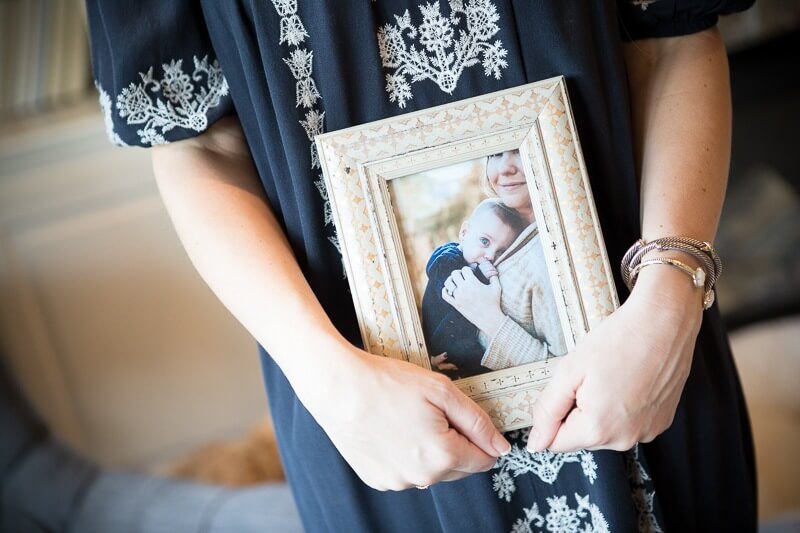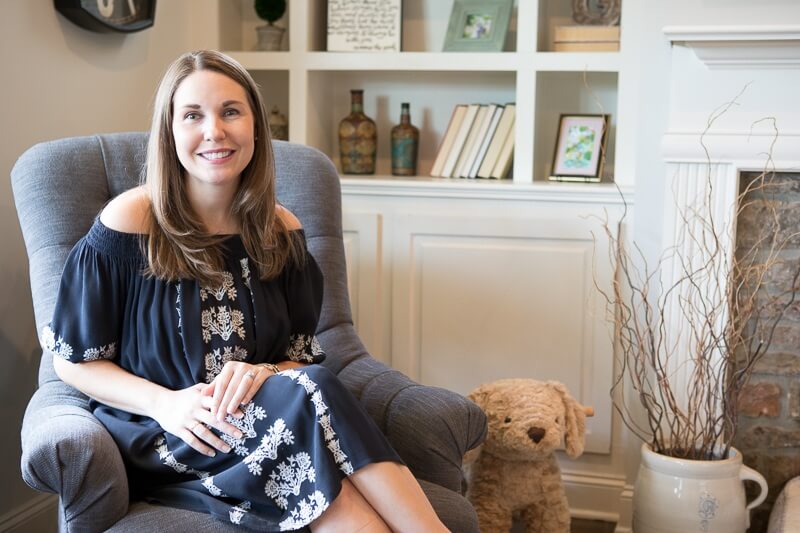Lauren Collins has a life similar to most other 33-year-olds. She had her dream wedding, marrying her dream man; she owns a cute home on Atlanta’s Westside; she’s been a teacher for nearly 10 years; and she has an adorable Doodle, Franco. However, unlike most women in their early 30s, Lauren lost her infant son, Graham, to a genetic mitochondrial disorder, Alper’s Disease, in 2017. While seemingly uncommon, approximately 1 in 2,500 to 5,000 adults, teens and children are affected by mitochondrial disease, making it more common than childhood cancers. Always one to keep faith and hope alive, Lauren — now mom to her second little boy, Carter — channels her grief into educating others about Alper’s on her blog, advocating for genetic testing and organizing charitable events. In fact, on February 10, 2019, Lauren will host Brew & ‘Cue for Mito, a fundraiser in which the proceeds will benefit the United Mitochondrial Disease Foundation. While life after loss is most certainly a challenge, Lauren’s steadfast hope is an inspiration to us all. After all, as her blog’s tagline reads, “A disease may be rare, but hope should not be.” We’re speaking with Lauren today about her journey, where she finds strength and how her faith plays an integral role in healing. Meet Lauren Collins, today’s FACE of Atlanta.

Tell us a little bit about yourself and your journey into motherhood.
I am a high school history teacher. I work with young adults and try to teach them about history, life and how to develop character skills. I also identify myself as a wife and mom. My story that I always share with my students is that my title as a mom is a little unusual. I became a mom with my first born, Graham, who was born prematurely at 24 weeks. Immediately becoming a mom to a child with medical needs was definitely an interesting road that tested me in my new role as a mother. After spending 105 days in Northside’s NICU, he came home, and we had a wonderful experience, but he was a kid with a lot of different challenges. We were always going to different appointments. After a year, he was diagnosed with a rare medical disease called Alper’s, and he passed away. So, yes, I was a mom to a child and then lost my child, but I still identify myself as a mother because even though he’s not here, I’m still a mother to him. Now, I’ve been blessed with being a mom to a second little boy, Carter, who does not have the same genetic disease. We are now taking on this journey of being parents to a child who is very different from his brother because he is very healthy.
How has your experience been a part of your story without defining you? In what ways does it define you?
I definitely think it defines who I am. A lot of your life’s trials shape you into the person you end up becoming. I know the loss of my father [in 2011] made me a stronger person and helped with my faith, and then obviously this with everything we’ve gone through with Graham. When I introduce myself to my students on day one, I show them pictures of my husband; I talk about how much we love to travel; I show them pictures of Franco, and then I show them pictures of Graham. It’s very much a part of me and my story. My students have respected me more because I’m not afraid to show the good, the bad and the truth of how hard life can be and then rising above it. Everyone handles loss, grief and tragedy differently, and I just want to be an example of how you can have hope and faith despite it. I feel like that’s something that was put on my plate, and that I can do it. I enjoy it.
RELATED: Michelle Carey: FACES of Atlanta

Your blog outlines your journey while answering people’s burning questions. Why is this an important, safe and informational space for you?
That was a choice we deliberately made. My husband is a lot more conservative about posting online and to social media, but I felt differently. After discussing this, he agreed on how important it is to share our story to help others. To me, it was more of a healing process to get out there and to say what’s going on. I know everyone is different, and this is what’s helped us and specifically helped me. It’s a place for me to share what’s going on, update family members about what we’re going through and be an outlet. When we were getting different diagnoses and I was doing research, there wasn’t a lot out there online. What I was finding was either outdated or really negative. I wanted to have a space that would have more of a real spin but also a positive spin. When you know you’re a carrier of a rare disease, you have a choice to make. Do you want to naturally get pregnant and take the risk? Do you want to go the IVF route? I knew it would be a hot topic because everyone seems to have an opinion on it, but I wanted to present it anyway and provide some insight for it. There are a lot of people who don’t know much about that journey. The IVF process is hard, and I wanted people to be more aware. I was naive, and I didn’t know it doesn’t necessarily always work. I wanted to be real with people. The whole purpose of this blog is to do that.
How has advocacy empowered you and helped with healing?
For us, it was so difficult to get a diagnosis because our disease is so rare. I recently connected with a family who got diagnosed a lot sooner than we did. I’m so encouraged by that because if we had been able to be diagnosed a little earlier, we would have avoided a drug that intensified everything. I’m not saying it would have made a difference in the outcome because it wouldn’t, but I think that’s where the advocacy of educating, making people aware and getting people to do genetic screening makes a world of difference.

Your faith is unwavering and is a huge part of your life. How does your faith guide you? How has it remained a support system and brought you comfort?
I grew up in a family that went to church every Sunday. It was part of my routine, but I don’t think I had the best relationship with my faith growing up. It was just part of what we did every week until my dad became sick. Watching my dad through his journey with cancer and watching his faith, despite something so awful, be so strong and be the one who’s going through the chemotherapy and be the one who is going to die, share his testimony, that impacted me. It got me more involved. It made me want to see everything my dad was talking about.
When Graham was born, the doctors gave us the statistic that he had a 50% chance of surviving, and if he does survive, he would have a laundry list of problems. My husband and mom were so upset, and I was the one who said, “But didn’t you hear? He’s got a 50% chance he’s going to be okay.” To me, that was an immediate example of looking at how good God can be given the medical data and jargon that’s put in front of you. That started to open my eyes. When Graham was at CHOA, we again turned to our faith, and this time we had a very different outcome, but I feel like we were still lucky. I think the only way you can see that side of what we went through is because of faith and because of God. It’s much easier to look at all the things that were unfair, but to me, seeing the benefits of what we went through, it has to be faith.

What advice would you give someone who has a child with an illness or a prolonged hospital stay?
My biggest piece of advice is to ask every question you can possibly think of. Talk to your doctors and get on the same page about what you can do in the moment and what you can do long term. Talk to the nurses. Write down information. Be as involved in their care as you possibly can. However don’t beat yourself up if you’re being pulled away from your child’s bedside because you have to provide for other family members, or you’ve got other responsibilities. Be kind to yourself.
Have you started thinking about how you will teach Carter about his brother and what makes your family and his siblings unique? Do you know what that will look like?
We’ve talked about it. We want to celebrate Graham’s birthday and make that a family tradition. If you look around our house, we’ve got pictures of him. I don’t know exactly how we’ll go about doing it, I just know it’s going to be a part of our story. Saying to Carter, “This is your brother, and he’s looking out for you every day. You’ve got this little angel that’s protecting you.”

What’s the best piece of advice that you’ve ever been given?
Something my dad always would tell us is, “Character is what you do when no one is watching.” I feel like that’s such a true statement. You do it not because you want the credit or the validation for whatever it is you’re doing. You do it because you know it’s the right thing to do. I feel like that’s something that I even share with my students and will share with our kids as well. I think if you live your life trying to do what is right versus what you can get credit for, it will make the world a better place.
Excluding faith, family and friends, what are three things you can’t live without?
Truthfully, every day begins with me going through Timehop or just memories on my phone and looking at pictures from the past. I love my photos — whether it’s a good memory or sad one, and I’d be lost if I couldn’t look at them anymore. I also have a sentimental Graham necklace that I wear practically every day. It helps me to keep him close to my heart. Finally, I seriously do have a Starbucks chai tea addiction. I can’t live without it!
Thank you, Lauren, for opening your heart to us today. To follow along with Lauren’s journey, visit her blog growgrahamgrow.com. Thank you to Catrina Maxwell of CatMax Photography for these beautiful photos of Lauren.



















